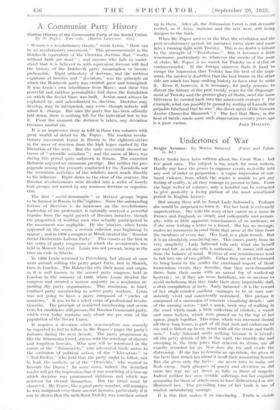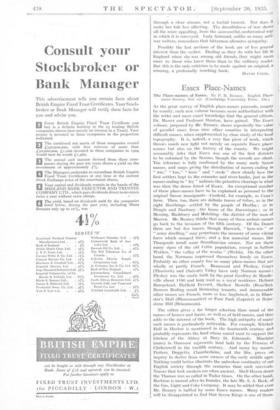Undertones of War
MANY books have been written about the Great War : but few good ones. The subject is too much for most writers. Hardly any have the power to organise events so ;terrific into any sort of order or proportion : a vague impression of con, fused violence, from which the reader is unable to get any feeling of reality, is all they manage to present to him. From the huge welter of volumes, only a handful can be extracted to give posterity a living picture of the most sensational period in English history.
But among these will be found Lady Salmond's. Perhaps she would be surprised to learn it. For her book is extremely unpretentious. She tells the story of her career as a nurse-in France and England, as simply and colloquially and person, ally, with as little apparent consciousness of an audience, as if she were writing a letter to a friend. She has no message, makes no comments beyond those that arose at the time from the incidents of every day. Her book is a plain record. But it is an absolutely convincing one. This comes partly from its very simplicity : Lady Salmond tells only what she herself saw and felt, so all she tells is authentic. It comes still more from the balance of mind. Writers of war reminiscences tend to fall into one of two pitfalls. Either they are so determined. to bring honie to the reader the emotional import of those tremendous events they describe, that they over-dramatise them, haze their scene. with an unreal fog 'of worked-up hysteria ; or, if they are more fastidious, are so anxious to avoid melodrama that they make their story improbably dull, a drab compilation of facts. Lady Salmond—it is the reward. of her single-minded candour—manages to be at once con-. sistently vivid and consistently restrained. Her picture is composed of a succession of concrete visualising details : one.' of the nursing sisters " had a quick, brisk way of walking the ward which made a little collection of trinkets, a watch and some lockets, which were pinned on to the top of hes apron, jangle together. This noise, which was incessant during, all these long hours, is part of all that rush and endeavour tO roe and is linked up in my mind with all the strain and tired+.) rteis." Lady Salmond omits nothing because it is trivial all the petty details of life in the ward, the trouble she had sweeping it, the little jokes that relieved its strain, are exactly, recorded for us. Nor, does she try and evade the distressing. If she has to describe an operation, she giVes us, the facts that struck her about it in all their nauseating horrors But she gives only the facts : she never tries to make our flesh creep. Such glimpses of gaiety and elevation as did come her way are set down as fully as those of tragedY.. Indeed' neither her own terrible sufferings nor her exquisite sympathy for those of others seem to have disheartened or dis= illusioned her. The prevailing tone of her book is one of modest unhesitating courage.
It is this that makes it so convincing. Truth is visible
through a clear stream, not a turbid torrent. Nor does it make her tale less affecting. The dreadfulness of war shows all the more appalling, from the unrcsentful, unrhetorical way in which it is conveyed. Lady Salmond, unlike so many anti- war writers, remembers that bitterness alienates sympathy.
Possibly the last sections of the book are of less general interest than the earlier. Dealing as they do with her life 10 England when she was among old friends, they might mean more to those who knew them than to the ordinary reader. But this is the only criticism to be made against an original, a
winning, a profoundly touching book. DAVID CECIL.







































 Previous page
Previous page